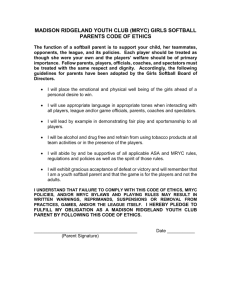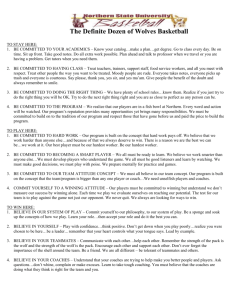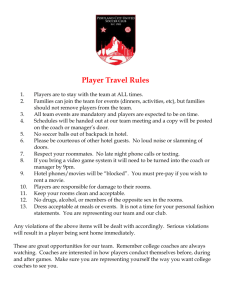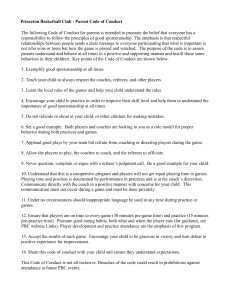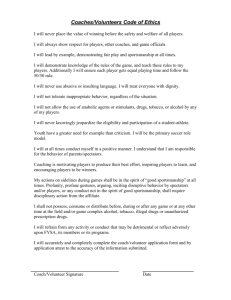Have We Lost the Meaning of Team?
advertisement
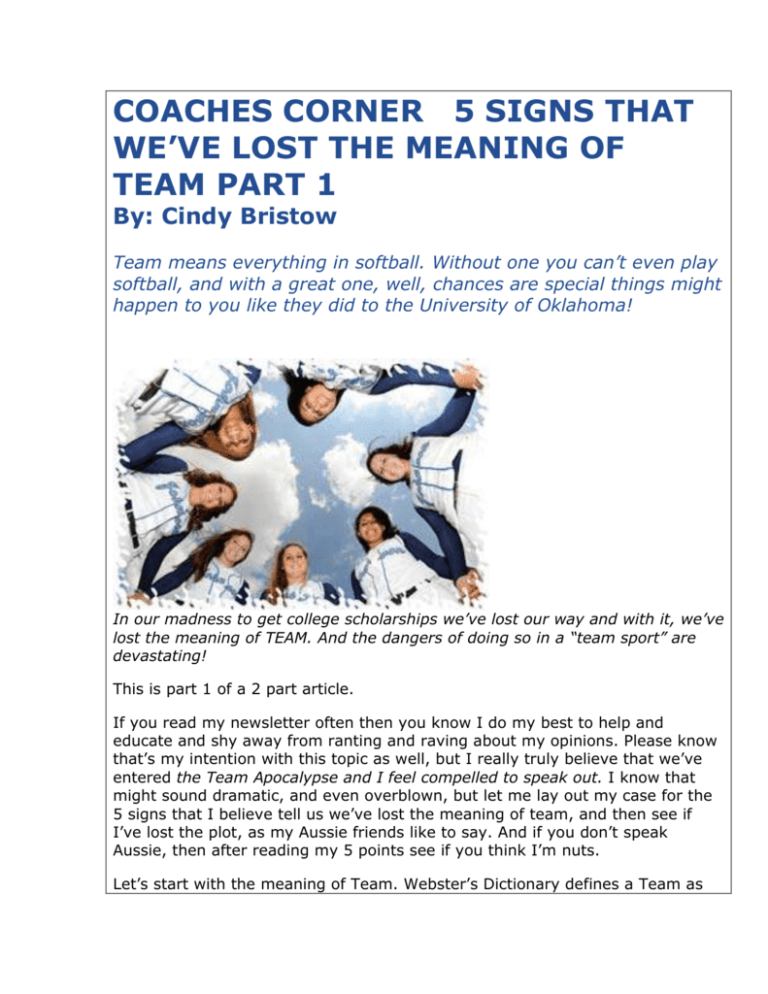
COACHES CORNER 5 SIGNS THAT WE’VE LOST THE MEANING OF TEAM PART 1 By: Cindy Bristow Team means everything in softball. Without one you can’t even play softball, and with a great one, well, chances are special things might happen to you like they did to the University of Oklahoma! In our madness to get college scholarships we’ve lost our way and with it, we’ve lost the meaning of TEAM. And the dangers of doing so in a “team sport” are devastating! This is part 1 of a 2 part article. If you read my newsletter often then you know I do my best to help and educate and shy away from ranting and raving about my opinions. Please know that’s my intention with this topic as well, but I really truly believe that we’ve entered the Team Apocalypse and I feel compelled to speak out. I know that might sound dramatic, and even overblown, but let me lay out my case for the 5 signs that I believe tell us we’ve lost the meaning of team, and then see if I’ve lost the plot, as my Aussie friends like to say. And if you don’t speak Aussie, then after reading my 5 points see if you think I’m nuts. Let’s start with the meaning of Team. Webster’s Dictionary defines a Team as the following: team noun \têm\ 1 Definition of TEAM : a number of persons associated together in work or activity: as a group on one side (as in football or a debate) While this definition isn’t wrong, it doesn’t really capture the true meaning of the word “team” in the way that those of us playing team sports use it to describe more than just a group of people. You see to me, there’s a HUGE difference between a group of people and a team. We’re in groups all the time – at Disneyland, in movie theatres, in malls, even waiting in our cars at a traffic light. But, these aren’t teams. Sure, you all have something in common like enjoying rides, or that particular movie, or shopping or driving, but that’s where it ends. And while you might be polite with other people in the mall or in line for the same ride, you don’t work together in any way. Teams are different than groups. The members of teams are trying to work together to achieve something. They’ve got to cooperate, determine roles, play their roles well and communicate. Teams exist because together you’re more powerful that you are apart, or because it takes everybody on the team to play the game. Sports like tennis and golf and swimming and running can be played by one person so there is no need for a team. Have you ever tried playing softball by yourself? You can’t do it. You might act like you can, or think you’d be better off without your crummy teammates, but just once try playing a softball game without any teammates and see how good you are – you’d lose to a horrible team. So here’s the best example of a Team vs a Group that I’ve ever heard, and it involves an elevator. Think about the last time you were in an elevator. No doubt you were with a group of people. You probably didn’t know them; you were all just using the elevator to get where you were going. So you had something in common but other than making room for people and possibly pushing their button for them, you didn’t have to work together in any capacity. Now imagine that elevator gets stuck in between floors! Boom, that group just became a team. Suddenly you have a mission, you have more than something in common – you’re all compelled and motivated to accomplish something, like getting out! So what happens next? People assume different roles, right. The Leaders start figuring out the plan, the followers carry out the plan, the scaredy-cats hide in the back but everyone must work together to get out of the elevator. The clearer that everyone is about how they can best help the situation and the more the group works together the faster everyone will get out. That’s exactly how a good softball team operates. Players need to first have a c ommon mission (like winning games, or playing their best, or outscoring their opponents), then they have to have roles (stars, support players, bench players, specialists) and then they all have to cooperate and perform their role well in order to achieve their mission. Think about this year’s WCWS winning team The University of Oklahoma. They had some stars like Keilani Ricketts and Lauren Chamberlain but they also had support players like Brianna Turang and Georgia Casey and role players like Michelle Gascoigne as well as bench players you never heard of. But every single player on that team not only had a specific role (keep in mind that all roles aren’t equal since all skills aren’t equal), but they all valued each other’s roles! They definitely got out of their elevator! Now let’s look at most current-day Travelball teams. They operate more like groups than teams – people temporarily on the elevator simply waiting for the next floor. Players fight against the role they’re given instead of accepting it or working hard to change it. Casting blame out-weighs cooperation and winning takes a huge back seat to personal advancement and visibility. And while the concept of team might sound too ideal for those of you currently in the trenches trying to earn a softball scholarship, keep this in mind – you’re working to have a college softball TEAM ask you to become a part of it, and all that involves. So I ask you – are you ready for what it takes to be a member of a real Team, and if not, you better start getting ready NOW. So, after watching softball on all levels botch up the concept of TEAM, here are my 5 Signs that We’ve Lost the Meaning of TEAM: 1. 2. Team Jumping – Players change teams all the time now. It starts in Travelball where it’s common for players to play on 3-4 different teams in one summer! Granted, you can make a poor decision regarding which team to join, but after 4 bad decisions it simply makes you look like a bad decision maker. Changing teams all the time is a huge warning sign to anybody paying attention (like college coaches) since it makes them wonder what’s wrong with you that you can’t stay on one team? I see players leave a team simply because they don’t play enough, or play the position they want to play, instead of practicing more so they’re better. Changing teams may be your short-term answer but if you truly are trying to play college softball then changing teams gets a whole lot more difficult and carries with it a lot greater penalties and consequences at the collegiate level. 3. 4. 5. 6. Guesting – This is almost like changing teams without actually calling it that. Players that guest are actually on one team, but then leave that team to “guest” on other teams. I’m sorry but there’s NO WAY you’re a team player if you’re guesting all the time. I’m not trying to be mean by saying this, I’m simply being factual since you can’t possibly care about your teammates if you’re leaving them all the time to play with other teams. Players that guest all the time have definitely put themselves ahead of their team and that’s not what a college coach is out there looking for. Never mind that they can’t even find you to watch you play because they can’t keep track of what team you’re on this weekend. It Wasn’t My Fault – It’s interesting but nothing is anyone’s fault anymore. Pitchers blame their defense if they don’t pitch well, coaches blame players, parents blame coaches and everyone says “it’s not my fault”. Well it has to be somebody’s fault, and besides, who cares about fault. What matters when somebody makes a mistake is how quickly you’re going to fix it, not how fast can you declare you didn’t do it. Mistakes don’t kill you; they happen all the time at all levels. What will kill you is acting like you didn’t do them, blaming others and never figuring out how to fix the things you’ve messed up. Playing on a team isn’t about placing blame, it’s about helping your teammates, it’s about working together, it’s about being good on a day when your teammate isn’t and knowing that she’ll cover for you on your off-day. Teams help and work and play for each other – they don’t complain and blame and leave each other hanging.
